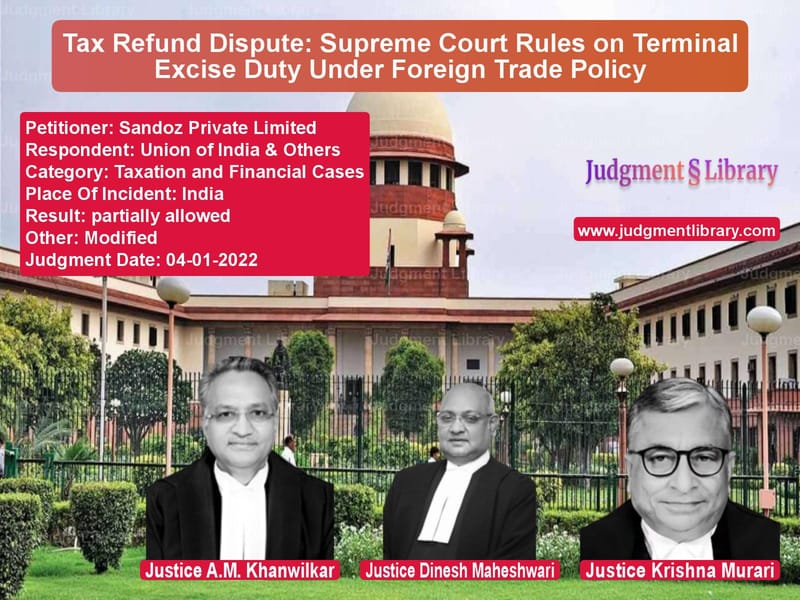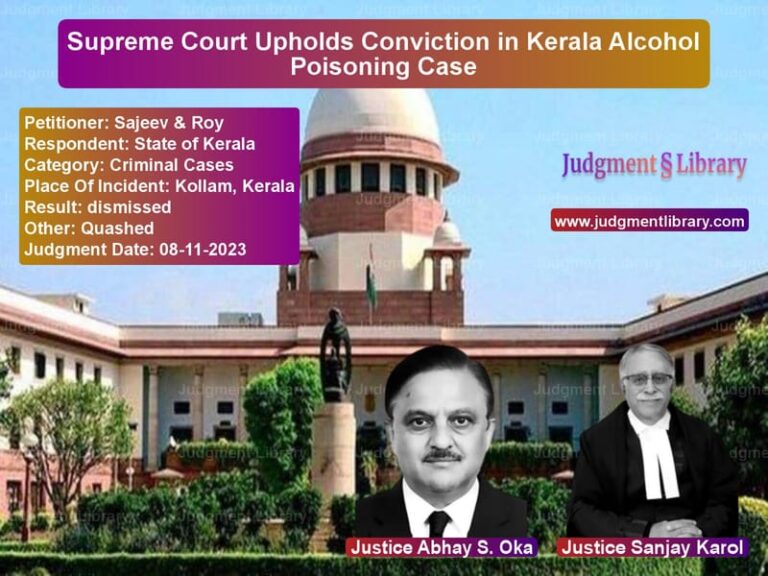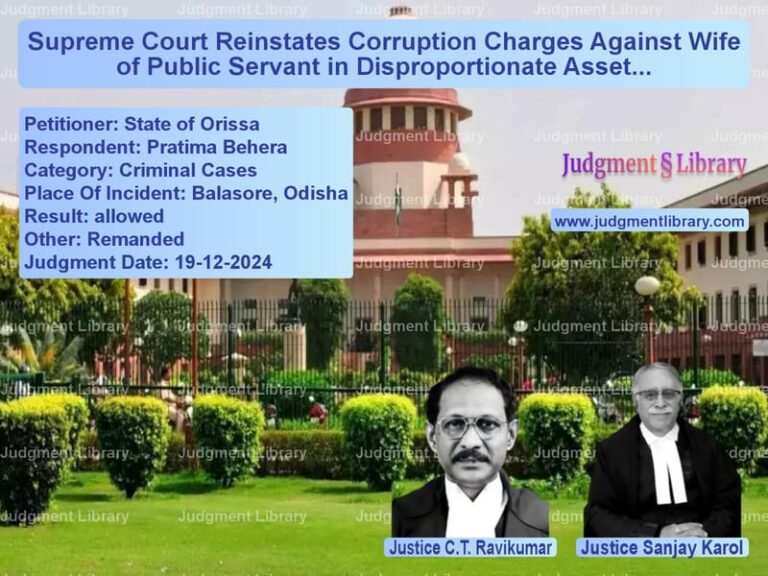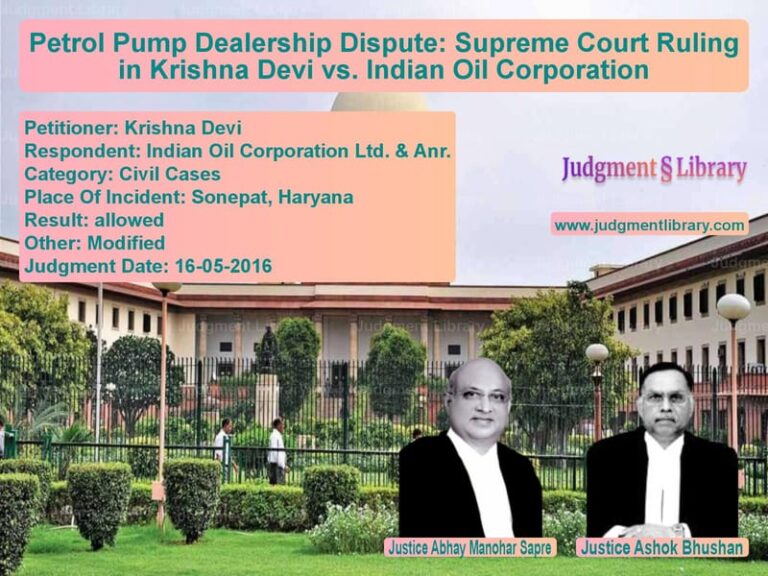Tax Refund Dispute: Supreme Court Rules on Terminal Excise Duty Under Foreign Trade Policy
The case of Sandoz Private Limited v. Union of India & Others revolved around the issue of tax refunds under the Foreign Trade Policy (FTP) and whether companies operating as Export-Oriented Units (EOUs) were entitled to claim a refund of Terminal Excise Duty (TED) paid on goods procured from Domestic Tariff Area (DTA) suppliers. The Supreme Court had to decide on the legality of rejecting TED refunds based on policy circulars issued by the Directorate General of Foreign Trade (DGFT).
Background of the Case
Sandoz Private Limited, a pharmaceutical company, operated as an EOU and procured goods from DTA suppliers for manufacturing export products. The company had regularly received refunds of TED from 2006 to 2012. However, when it applied for TED refunds for the period of July 2012 to December 2012, amounting to approximately ₹3.26 crore, the refund was denied.
The rejection was based on a policy circular issued by DGFT on March 15, 2013, which stated that no TED refund should be provided for supplies from DTA to EOU since such supplies were ‘ab initio’ exempted from excise duty. Sandoz challenged the rejection before the Bombay High Court, which dismissed its petition. This led to an appeal before the Supreme Court.
Arguments of the Petitioner (Sandoz Private Limited)
- The policy circular dated March 15, 2013, introduced a new rule, which was contrary to the existing Foreign Trade Policy (FTP) and should not apply retrospectively.
- Under Chapter 8 of the FTP, DTA suppliers were entitled to a refund of TED, and EOUs could claim this refund through a disclaimer from the supplier.
- The company had already been granted TED refunds for similar transactions in the past, and the sudden denial was arbitrary.
- The FTP provided clear entitlements for TED refunds, and these could not be taken away merely through a policy circular.
Arguments of the Respondents (Union of India & DGFT)
- The policy circular was merely a clarification and did not introduce any new rule.
- Supplies from DTA to EOUs were already exempt from excise duty under Para 6.2(b) and Para 6.11(c)(ii) of the FTP, making any TED refund unnecessary.
- The refund claims made by Sandoz were inconsistent with the provisions of the FTP, as excise duty was not meant to be paid on such transactions.
- Granting refunds under the earlier interpretation led to unintended financial implications for the government.
Key Observations of the Supreme Court
1. Legal Authority of Policy Circulars
The Court noted that a policy circular issued by DGFT could not override the provisions of the FTP. It ruled:
“A circular issued by an executive authority cannot impose restrictions beyond what is provided in the parent law.”
2. Interpretation of ‘Ab Initio’ Exemption
The Court clarified that the term ‘ab initio’ exemption applied to EOUs, meaning that they were not required to pay excise duty on goods procured from DTA. However, it observed that:
“If duty is paid by the DTA supplier, the entitlement to claim a refund must be determined based on the provisions of Chapter 8 of the FTP.”
3. Rights of DTA Suppliers and EOUs
The Court ruled that under Para 8.3(c) of the FTP, TED refunds were allowed in cases where no upfront exemption was claimed. If duty was paid, a refund could be sought, subject to the conditions in Para 8.5, which prohibited refunds if CENVAT credit had been availed.
“The benefit of TED refunds was granted to encourage domestic suppliers, and this should not be denied retrospectively.”
4. Impact of the 2013 Circular
The Court ruled that the circular dated March 15, 2013, could not have a retrospective effect and could not be used to reject refund claims for transactions that took place before its issuance. The Court observed:
“Government policies cannot be altered retrospectively to the detriment of businesses that have acted in accordance with prevailing laws.”
Final Judgment
The Supreme Court partially allowed Sandoz’s appeal, ruling:
- The rejection of TED refund claims before March 15, 2013, was invalid, and Sandoz was entitled to a refund for those claims.
- For transactions after March 15, 2013, TED refunds were not permissible due to the revised policy.
- The retrospective application of the policy circular was unconstitutional.
- The concerned authorities were directed to process refund claims based on the FTP provisions applicable at the time of each transaction.
This ruling reinforces the importance of adhering to the legal framework established under the FTP and ensures that businesses are not unfairly denied refunds based on retrospective policy changes.
Petitioner Name: Sandoz Private Limited.Respondent Name: Union of India & Others.Judgment By: Justice A.M. Khanwilkar, Justice Dinesh Maheshwari, Justice Krishna Murari.Place Of Incident: India.Judgment Date: 04-01-2022.
Don’t miss out on the full details! Download the complete judgment in PDF format below and gain valuable insights instantly!
Download Judgment: sandoz-private-limit-vs-union-of-india-&-oth-supreme-court-of-india-judgment-dated-04-01-2022.pdf
Directly Download Judgment: Directly download this Judgment
See all petitions in Tax Refund Disputes
See all petitions in Customs and Excise
See all petitions in Banking Regulations
See all petitions in Judgment by A M Khanwilkar
See all petitions in Judgment by Dinesh Maheshwari
See all petitions in Judgment by Krishna Murari
See all petitions in partially allowed
See all petitions in Modified
See all petitions in supreme court of India judgments January 2022
See all petitions in 2022 judgments
See all posts in Taxation and Financial Cases Category
See all allowed petitions in Taxation and Financial Cases Category
See all Dismissed petitions in Taxation and Financial Cases Category
See all partially allowed petitions in Taxation and Financial Cases Category







